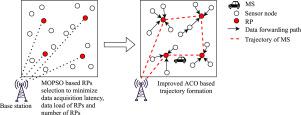Journal of Network and Computer Applications ( IF 7.7 ) Pub Date : 2021-10-06 , DOI: 10.1016/j.jnca.2021.103234 Anjula Mehto 1 , Shashikala Tapaswi 1 , K.K. Pattanaik 1

|
Traditionally, the non-rendezvous points transmit data towards Rendezvous Points (RPs), and Mobile Sink (MS) visits RPs to collect data. The existing body of research mitigates the problem of data acquisition latency, load on RPs, and energy consumption by regulating the number of RPs. Fewer RPs benefit the data acquisition latency, whereas increased RPs benefit the multi-hop forwarding and load on RPs. This paper takes up these issues and models as multi-objective optimization problem attempting to minimize data collection latency, data load among RPs, and the number of RPs. Particle Swarm Optimization (PSO) is the widely used meta-heuristic method to solve a multi-objective optimization problem with better convergence and minimum overhead. This paper introduces a Multi-Objective Particle Swarm Optimization based RPs Selection (MOPSO-RPS) method for energy and delay efficient data collection. MOPSO-RPS applies a new encoding scheme to generate variable dimension particles that represent each possible set of RPs. Additionally, a new inertia weight tuner is also referred to enhance the convergence speed of multi-objective PSO towards the optimal solution. However, it might happen that after updating the location and velocity in each iteration, the particles become invalid due to the violation of the search space boundary. Thus it adopts a valid particle generator to create valid particles. Moreover, an improved ant colony optimization is also applied to construct the trajectory of MS with fast convergence speed towards the optimal solution. Simulation results depict that the proposed MOPSO-RPS result in 18.61%, 21.11%, and 10.71% average improvement in energy consumption, data load among RPs, and data acquisition latency, respectively, for different number of sensor nodes when compared with the state-of-the-art methods.
中文翻译:

基于多目标粒子群优化的能量和延迟高效网络无线传感器数据采集的交会点选择
传统上,非集合点向集合点(RP)传输数据,移动宿(MS)访问 RP 以收集数据。现有的研究主体通过调节 RP 的数量来缓解数据获取延迟、RP 负载和能源消耗的问题。较少的 RP 有利于数据获取延迟,而增加的 RP 有利于多跳转发和 RP 上的负载。本文将这些问题和模型作为多目标优化问题,试图最小化数据收集延迟、RP 之间的数据负载以及 RP 的数量。粒子群优化 (PSO) 是一种广泛使用的元启发式方法,用于解决具有更好收敛性和最小开销的多目标优化问题。本文介绍了一种基于多目标粒子群优化的 RPs 选择 (MOPSO-RPS) 方法,用于能量和延迟高效数据收集。MOPSO-RPS 应用新的编码方案来生成表示每个可能的 RP 集的可变维度粒子。此外,还提到了一种新的惯性权重调谐器,以提高多目标 PSO 向最优解的收敛速度。然而,在每次迭代中更新位置和速度后,可能会发生粒子由于违反搜索空间边界而失效的情况。因此它采用有效粒子生成器来创建有效粒子。此外,还应用了改进的蚁群优化来构建具有快速收敛速度的 MS 向最优解的轨迹。






























 京公网安备 11010802027423号
京公网安备 11010802027423号